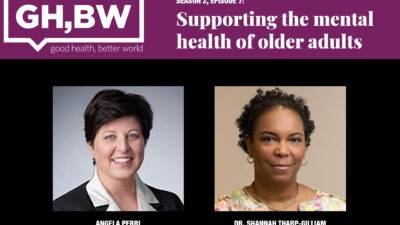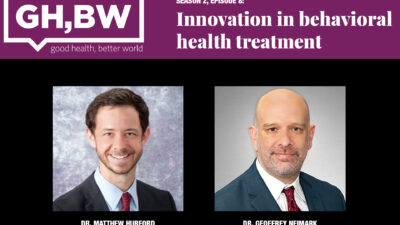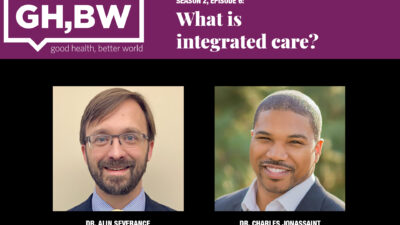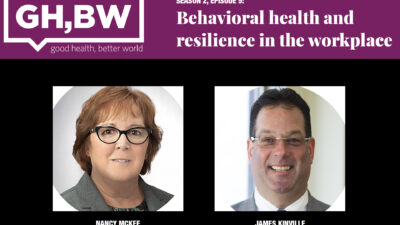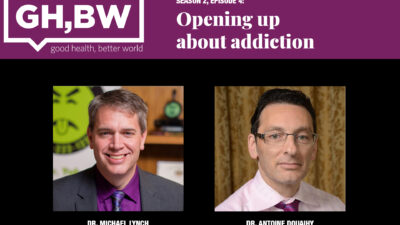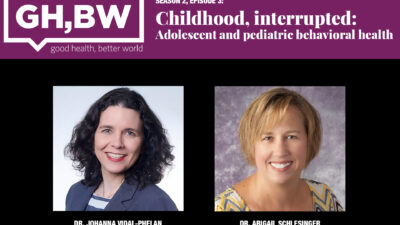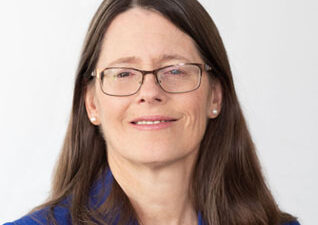In this episode:
As we age, mental and physical changes can leave some people feeling left behind — perhaps even more isolated as a result of the pandemic, and other life changes. It doesn’t have to be that way. Listen in for a discussion about special considerations affecting the mental health of older adults, and how to recognize signs of depression.
In this episode we hear from Angela Perri, vice president and chief Medicare officer for UPMC’s Insurance Services Division and Dr. Shannah Tharp-Gilliam, deputy director for the Area Agency on Aging within the Allegheny County Department of Human Services in Western Pennsylvania.
Have questions? Email us at [email protected]
Resources:
Are you experiencing a crisis or are concerned about a loved one?
- For general help, Allegheny County residents can call resolve Crisis Network which provides crisis counseling for a variety of issues, at 1-888-796-8226, or click here.
- For help with addiction, call the Substance Abuse and Mental Health Service Administration's hotline at 1-800-662-4357, or click here.
- For general resources on addiction and mental illness, visit the Substance Abuse and Mental Health Services Administration, here.
- For help with a mental health crisis, reach National Alliance on Mental Illness by dialing 988, or click here.
- To reach UPMC Western Psychiatric Hospital and UPMC Western Behavioral Health, call 1-877-624-4100, or click here.
- UPMC Health Plan members can learn more about behavioral health programs, tools, and resources, by clicking here.
- To learn more about Community Care Behavioral Health, click here.
More:
The SeniorLine through the Allegheny County Area Agency on Aging is a one-stop resource for questions. Call 412-350-5460 or toll-free at 1-800-344-4319. Visit the website here.
If you suspect a loved one is being abused, call protective services at 412-350-6905 or 1-800-490-8505, with concerns about the well-being of a person over the age of 60 years. The phone line is answered 24 hours a day. For more information, visit the website, here.
Area agencies on aging in Pennsylvania offer an array of services and information for senior citizens and their families. To find an agency near you, call 717.541.4214 or visit the website for P4a, an association of the agencies, here.
“The Blue Zones,” is a 2008 book by Dan Buettner that explores areas of the world with a high concentration of centenarians. The concept was developed into a company, now owned by Adventist Health.
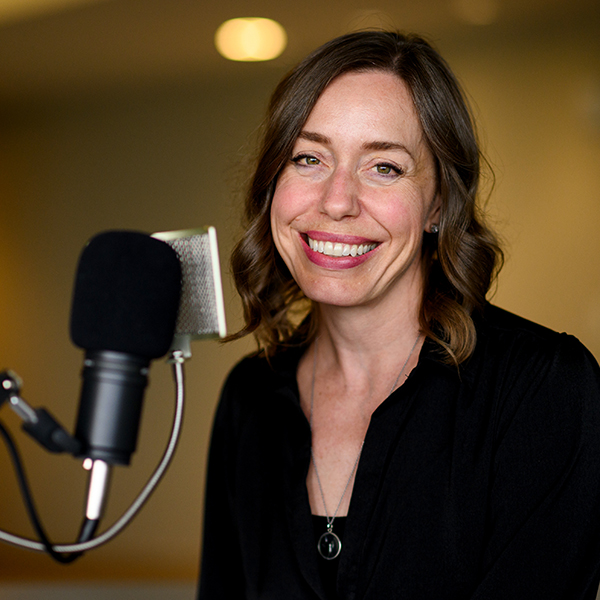
Dr. Ellen Beckjord: On this episode of Good Health, Better World, we're going to talk about supporting the mental health of older adults. I am very happy to have with me Angela Perri, Chief Medicare Officer at UPMC Health Plan, and Dr. Shanna Tharp-Gilliam, administrator of the Allegheny County Area Agency on Aging and Deputy Director of Aging Services at the Allegheny County Department of Human Services. Angela, welcome to Good Health, Better World.
Angela Perri: Thank you. Glad to be here.
Dr. Ellen Beckjord: Shannah, welcome.
Dr. Shannah Tharp-Gilliam: Thank you very much, Ellen. Glad to be here.
Dr. Ellen Beckjord: Let's start by talking about older adults and what we know about challenges that can come up with respect to their mental health. And I'm also happy to hear from either of you about ways that older adults are resilient or even protected from some of the challenges that we might face earlier in life related to mental health. And Shannah, can I start with you?
Dr. Shannah Tharp-Gilliam: At the Area Agency on Aging, we come in contact with adults of so many different experiences. Some of our adults are very active in their communities. Others of them are isolated there alone, and they're looking for people to come into their home and to help them with basic care needs, or even just to sit and talk. So, when we're talking about the struggles that seniors face, we're not just talking about one type of individual, but just like anyone who's under 60, there are all types of contributors to their experience and what their needs are and what they're looking for.
Dr. Ellen Beckjord: Thanks for pointing that out, you said older adults — of course, this is a diverse population that really spans a lot of years that matter, right? You know, thinking about older adults in their 70s is different than thinking about older adults in their 80s or their 90s. We certainly don't want to overgeneralize. And thanks for sharing some of the different experiences that people are bringing to the table.
Angela, from your perspective as the Chief Medicare Officer for our Medicare Advantage product at UPMC Health Plan, what are some of your thoughts about behavioral health and older adults?
Angela Perri: Just coming out of the pandemic, we realized that we all just faced depression, anxiety, loneliness, fear in all sorts of different ways and at various levels. So, it's important to keep in mind that mental health is critical to every decision, because you make a different decision from a place of fear than you do from, you know, maybe normal decisions that you would regularly make.
And our seniors are facing many decisions all the time, every day, about their health. So, it's central, I think, to better outcomes. It's central to better health and not something that we can take as an aside or something else we should focus on — it has to be part of the whole person.
Dr. Ellen Beckjord: I think there's necessarily, and appropriately, a lot of attention paid to the physical health of our seniors. Do you think, and I'd love to hear from both of you, that it makes it especially hard to ensure that we really prioritize and maintain an appropriate level focus on mental and behavioral health and seniors, too?
Angela Perri: I think it's when we think about physical health, it's somewhat easier for us to understand. We have protocols and processes, and it's more linear sometimes, and it's in how we think about it. But there's more art than, you know, and science together when it comes to behavioral health.
There's many components to it. And I think we've gotten better at paying more attention to the behavioral health aspects on the physical health side. But still, there's so much more room for not just a handoff between the physical health provider, or the behavioral health provider, but just that empathy and education overall as part of everything that we do.
Dr. Ellen Beckjord: Like more true integration than handoff. It's not just that the two aspects of care can exist side by side and people can go between the two, but more of a real integration I hear you saying.
Angela Perri: Integration and conversation, because we have to be comfortable in the uncomfortable, and more physical health providers are starting to ask questions about how you feel and that not just pertaining to that physical health condition or event or episode, but what does that mean for you overall? Tell me about how you're doing.
Dr. Shannah Tharp-Gilliam: You know, to your point, Angela, I think another reason why I feel that people who are either aging into older adult status being, you know, in their mid to late 50s and even earlier, I think struggle with the idea of how do we really address the behavioral health aspects of our future selves?
Angela Perri: Mm hmm.
Dr. Shannah Tharp-Gilliam: It's a challenge, because, you know, we know that, well, you know, that if you eat a good meal, if you eat a balanced diet, if you exercise regularly, you know, if you stretch, you know, you do all these things physically that you have a higher likelihood of being able to live a more active life when you get older.
And, on the other hand, you know, although there's a lot of science behind, you know, how do you keep your cognitive function? There's still so much mystery in what really leads to some of the more common cognitive challenges that you see as you get older, such as dementia and even just common forgetfulness.
And another thing I've noticed is that there are a lot of people who are not yet in the older adult status, who don't have a lot of engagement with people who are older adults. So, they don't get to see the positive sides of becoming an older adult.
You know, they don't have that grandparent who they can ask a question about and get some sage wisdom and solid advice; or, you know, they don't have people in their daily network where they can see, well, you know what, yeah, your body does change as you get older, but you also feel much more liberated to be who you are and much more confident in the person who you're becoming.
So, I always like to think about, what is it that our older adults have to contribute to our society? What are the assets that they bring to our community? Why should they be treasured, elevated and cherished? Those are the thoughts that I like to talk about.
Dr. Ellen Beckjord: There is so much wisdom and so much potential to be realized in older adulthood.
In your position at the Area Agency on Aging and within the Department of Human Services, what are you observing and learning about with respect to identity reformation, with respect to some of the positive experiences that people have in older adulthood?
Dr. Shannah Tharp-Gilliam: Well, there was a study that came out recently by the Brookings Institute, and basically they were studying happiness at various ages across the population. And what they found were that the two happiest age groups were the 18- to 21-year-olds, and then seniors, older adults.
And I like to think that as I am aging into the senior adult population, there is a liberation, there's a freedom in feeling that I know who I am and I know what I can do, what I'm really good at. And I know where my challenges are. And I feel that, watching myself, watching my mother, watching the seniors and the elders in my sphere of influence in my family, you know, there is a freedom.
They're excited about being able to chart their own path and also, you know, being able to think about, you know, who do I want to be moving forward.
Now, I have to also say that there is another side to that, as well. As a person perhaps, who has been a parent or a mother or a father as your children continue to age, sometimes we have to take a new look at who we are becoming, and that's where that concept of identity reformation comes into play.
We're not needed on an everyday basis with our kids anymore. There is an opportunity to perhaps use our retirement as a chance to learn new skills, have new experiences, travel, just experience life differently. And at the same time, there's also the challenge of whether or not our finances can support those changes, whether our health care experiences have given us physically the access to the type of mobility that we would need to experience these new opportunities in our lives.
But, I love to think about the fact that, you know, in the next 10 to 15 years, I will be, hopefully, a brand-new person from who I am now.
Dr. Ellen Beckjord: Do you think that we need more concerted effort, even at like a policy level or maybe specifically at a policy level, to support that? Do we need to be more intentional about revisioning older adulthood as this time of opportunity and identity formation, rather than like the last chapter in a book?
Angela Perri: I would say yes, that for the most part we have, from a policy perspective, we are very condition-oriented. So, we focus on solving the condition, rather than looking at the experience. So, I would say, yes, I do think we're trying I think that, in general, whether it's from a CMS, from a policy perspective, as they're trying to reimagine the future and what does innovation really look like, and how do we embrace all of our populations very differently to payors, to our doctors or physicians or specialists, and our advocates too, how do we think about aging? What does that mean? And, I agree, it's an identity reformation.
So, becoming a senior, in the United States in particular, there's lots of different opportunities. And people are starting to take advantage of that in a lot of ways. And it can be empowering, but it also can be frightening, if you don't know what kind of services and supports are available to you.
Dr. Ellen Beckjord: As you talk about that, it strikes me that older adulthood is a dynamic phase of life. When we had conversations about children and adolescents, we reflected on how dynamic childhood and adolescence are. But, older adulthood is very dynamic, too.
And I'd love to hear either of your thoughts on some of the transitions that are common in older adulthood, and ways that those transitions can challenge the health and well-being of older adults, and also ways that those transitions, if approached with the right set of supports and services, can really become opportunities for identity formation or just for continued personal growth and development. Dr. Tharp-Gilliam, do you have thoughts about that?
Dr. Shannah Tharp-Gilliam: I do. There's an expectation that young people are going to be exploring — they're going to be trying to learn who they are, developing into understanding what they're good at, what they're maybe not so good at, what they want to do, what they don't want to do.
That's an expectation in our culture. I posit that we need to have a similar expectation among older adults — that they're going to be rediscovering who they want to be. And I think that's important. I think it will require a cultural shift. I think about Pittsburgh 15, 10 or 15 years ago before the bike lanes. I think about how dangerous it was at that point to be a cyclist in Pittsburgh.
And I think about the campaign to change that. I think about the infrastructure, the built infrastructure that the city put in place with bike lanes, with, you know, lighting, with even the campaign to say, share the road. And I think about what would it look like if we had that type of attention on becoming an older adult? You know, let's share our society with those who are older, with those who may not be on the cutting edge of the latest trend. But what would that look like if we really changed the narrative around aging?
Angela Perri: I love that. Honoring our seniors also involves honoring their wisdom, their experience. I can't tell you how many times that my grandmother used to say to me, go outside and play. And t what that meant. But, there is something to that, that identity reformation, that connection that we still need.
And, as we think about valuing people — because at the end of the day, that's really what it is — we should be valuing who they are, their opinions, how they want to be treated, what their experience is in all that we do in health care, how they make decisions and choices, we should be serving up information to them in ways that helps them make the best decisions for themselves, and create programs and opportunities that allow them to participate how they want to and equip them with things like that.
And that means from a societal factor. I love the thought that you had there about thinking through what that means, that identity reformation. It means too maybe honoring all of those experiences that they've had across the years and what they learned, what they didn't learn and why they would make things different now than maybe what they experienced and how they would improve it.
What does that mean? So, from an honoring perspective, that's been part of all we've tried to do. I think from a UPMC perspective, when I think about my day-to-day work, we have a couple of mantras that we talk about, but beginning and ending with honoring our seniors, what is it that they would like to see us do? How can we better serve them? And I personally think about my grandmother and say, “what would she say?” Would she like this? Would this make sense to her? Would she look at me and shake her head?
Dr. Ellen Beckjord: [Shannah], you mentioned infrastructure when you talked about, used the analogy about the advocacy work that Bike Pittsburgh and other organizations have done to make it safer to bike in the Pittsburgh area where we're recording this podcast from and I want to return to that idea of infrastructure, because I think, you know, that probably there wasn't a necessarily a whole lot of disagreement with the idea that it would be good to have more cycling in Pittsburgh.
I don't know that there is a lot of opposition to the idea that it would be good to find more ways for seniors to continue to contribute in really meaningful ways to any of our societal structures and to share their lived experience and their earned wisdom with younger people. But it seems like it might be an infrastructure problem. What kinds of infrastructure do you think we need?
Angela Perri: I think there is more of an infrastructure, but not because it was an intentional design. I think part of what we're seeing from the pandemic has been the “great resignation.” And when you think about people making dramatic changes and wanting to do something differently and the shortages that's created, suddenly now, older adults are very interesting, to want to learn from them, to be able to better understand how they can contribute, how they might volunteer, what they might recommend, how they may transition something a little bit differently.
So, there's that aspect. From a separate kind of infrastructure perspective, I think that our services and support have been leaning more and more into staying at home and instead of being hospitalized or institutionalized as you age, but actually setting your home up in ways that allow you the greatest mobility, allow you to participate still in community and do different things.
So, I do think there's been intentionality around the recognition that there's opportunity to keep people in community and keep people at home, and that that is part of health and is part of your health journey. But it's not uniform and it's not consistent. There's inequities throughout all of it. So that's an area of infrastructure that is important to reconsider and to shore up differently because it isn't all the same.
Dr. Shannah Tharp-Gilliam: You know, Angela, I think you're hitting on a good point here. There is infrastructure. It's a complex system, and even to, you know, the earlier point that you were making in the podcast, Ellen, we're not talking about one type of person when we say older adult. When I look at the resources that were available for my mother when she lived in this area, there were robust opportunities. There were places that she could go. There were, you know, recreation centers.
There were plenty of opportunities. But some of those places just simply aren't accessible for people with limited transportation or without a membership to that particular neighborhood's community center. So, there's a lot that we can do. I think that as a public agency, I'm always looking to build capacity within the existing structures, within the existing senior centers. There are over 40 senior centers in our county, and they run the gamut.
Angela Perri: That's a great point. I think, too, one of the things that in the payor space, again, in combination with government rules and regulations about changing behavior in a different way that payers have begun to reimagine what they should be doing, being good stewards of the public funds. One of my favorite sayings that I use with my teams is, you know, ‘Be strong like water. Fill in those gaps. Figure out what the need is and then let's see if we can connect it.’
Our teams are designed and encouraged and empowered to be more concierge-like in their approach to listen, to understand what and where to make connections, and not just within pure health, not just doctor to doctor, but what are those additional resources? And how does that work and what does that mean? So, a lot of times it means more than just a surgery. It means the connection to the surgery. It means the aftercare. It means physical therapy. It might mean behavioral therapy, because now suddenly you've had an event that takes place, that changes your life, changes your mindset. How do you deal with that?
Dr. Ellen Beckjord: I think as I listen to the two of you talk, you know, three things come to mind. One is that it becomes even more important to look for places where new is possible. And that identity reformation is part of our discussion, because, even as loss happens, it doesn't mean that there can't also be gains and new things. It also occurs to me, I love what both of you are saying about the critical importance of supporting people to connect to services that exist. In our first season of Good Health, Better World, when we talked about social determinants, or social drivers or influencers of health across all episodes, when I took a step back, I was left with a real appreciation for all of the services that are available to address things like transportation or food security, housing security. But how complex and distributed those services are, and how people need help to find them, navigate them and make use of them, and I'd love to hear from both of you as leaders of services for older adults and seniors, about some of the services that stand out for you that you're really excited about and want to use our time together to showcase. But, even a little bit more, you've both done a great job of speaking to this already, but just more about how we can continue or improve our efforts to engage folks in the services that exist. So, Angela, would you mind going first?
Angela Perri: I think the connection component and being able to spend time connecting people is one of the things that many payers spend a lot of time doing, because we see ourselves as a resource. And that part of what that means is understanding how best to connect people to what is in their community, but also knowing what else doesn't exist, because there are things that we then can support the creation of in different ways for communities or neighborhoods where perhaps there's a great program that exists across town, but they may not necessarily have the resources to do it in a different location. But that might be something, as a payor who's working across all of these communities, we could create something, or support something, or connect something a little bit differently.
Dr. Ellen Beckjord: That was great. And I was thinking I was thinking as you were talking about how valuable your leadership on that connection front is, because I know I read your official title of Chief Medicare Officer, but Shannah, you may not know that Angela's unofficial title is “dot-connector-in-chief,” or “Chief Dot Connector.” There is certainly no shortage of dots to be connected here. But knowing that that's an area of emphasis, I think is really critical because that's a really important part of the picture here.
Angela Perri: Yeah.
Dr. Shannah Tharp-Gilliam: Well, at the Area Agency on Aging, I am very proud of my team. When you talk about services and supports for older adults, the first word that comes to mind is SeniorLine. And this is a number, a phone number that serves our community all across the county. People who are over 60 call and ask all sorts of questions. They ask questions about where can they identify, or where can they find particular resources? Or they may call with a problem, a challenge in their own household, in their own personal life, in their house, they may need to get something fixed.
So, if you have a challenge and you are 60 years or older, call the SeniorLine, and we will do everything in our power to make sure that you get connected to the right place.
Dr. Ellen Beckjord: We'll make sure to include it in our show notes.
Dr. Shannah Tharp-Gilliam: Another important resource at the AAA, is protective services. We've noticed a significant increase in the number of seniors who have been at risk for abuse and neglect since the pandemic. Interestingly, the most frequent type of abuse and neglect is personal neglect. People who are not taking care of their personal hygiene, are hoarding, are not getting adequate nutrition. So, here again, if there is someone in your life who you feel is just maybe not getting the type of care that he or she needs, either by their own hand or by someone else who is supposed to be caring for them, we really take those things seriously. They are elevated to the top of the call line, and we have investigators who come out and check on seniors if someone is concerned.
Dr. Ellen Beckjord: Well, the last question that I'd love to hear from both of you on is what you think the most important thing we can do now would be, to really support the overall health and well-being, but, in particular the mental and behavioral health and well-being, of older adults. Doesn't necessarily have to be feasible or, certainly, not easy, and I know it's hard to name just one thing, but if you had to choose one thing, which is where you think the greatest potential might be. Would you mind sharing your thoughts on what that might be? And whoever would like to go first?
Dr. Shannah Tharp-Gilliam: I'll go ahead. In the Area Agency on Aging, one of our key initiatives is around increasing the number of workers who are focused on older adult services, whether those are mental health services, people with geriatric backgrounds, whether it's people who work in home health care, or even geriatric medical providers, nurses. We need more people who are actually working in these areas. We are at the precipice of a tsunami of older adults. The population is going to continue to increase. And frankly, there are thousands of seniors who don't get the in-home care that they need, because there aren't enough in-home care workers. So, I think we really are at a critical point with that.
Dr. Ellen Beckjord: Thanks. Angela, what are your thoughts about the most important thing, or something that's really top of mind for you?
Angela Perri: I have a couple. So, I was struggling to keep it to one, as you know, and listening to you talk. But the number one thing I also had was the workforce shortage, and the impacts and what that means, because back to some of the elder abuse cases that we see or situations where people are isolated even more, or should be receiving care and aren't or can't, in community and in different ways. There's shortages in things like community health workers, certainly, but also health care, on the whole, because of the pandemic, people are fatigued. It's across the board.
And, so, there needs to be a reinvigoration around what it means to be a health care worker, and what does that mean for not just behavioral health or physical health, but, again, person health? How do we contribute in ways and hire, and be allowed to create different sorts of programs that are maybe a little outside the box, but are essential and necessary for community health, because we need to get back to community? It's one of the most important things when you think about blue zones or places where people live the longest and the healthiest overall, the thing that they have most in common is connection and purpose. And that seems like a central theme of something that we could lean into a little bit differently perhaps than we have.
Dr. Ellen Beckjord: Well, I really loved both of your answers. And because we're talking about behavioral health, we've talked about, you know, workforce shortage capacity — and that's concerning, I know it came up in this conversation — but I'll also say I'm always so hopeful because the guests that we have on this show who are part of the workforce trying to make health care and behavioral health better are just so amazing. So, I want to thank both of you so much for taking the time to talk with me today and to join us on Good Health, Better World. It's just been great to speak with you both.
Dr. Shannah Tharp-Gilliam: Thank you. The pleasure's been mine.
Angela Perri: Thank you. Very glad to be here.

